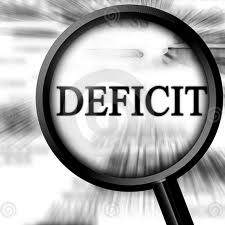
Primer: Federal Government Deficits and Debt
“The national debt, if it is not excessive, will be to us a national blessing.”
—Alexander Hamilton, to Robert Morris, 30 April 1781
- It is almost always necessary and beneficial to run annual government deficits; balanced budgets should be rare; surpluses should be fleeting and rarer still.
- It is inappropriate, even economically foolish to view the government’s income and expenditure account as a meaningful set of numbers without first considering its role in the macroeconomic balance of the economy.
- A key function of government debt in a modern, capitalist economy is to provide assets into which individuals can place whatever savings they cannot profitably invest in privately owned assets. Any debt less than this, the level of which automatically rises with unemployment, will force investor losses, reduced employment, and reduced real income.
- The efficiency of this function depends greatly on the way in which government taxing and spending decisions redistribute national income toward individuals and institutions likely to spend it fully and rapidly. More progressive fiscal policy, in other words, exploiting the natural tendency of consumption to fall relative to savings as income rises, makes it possible to achieve the required macroeconomic balance with smaller levels of deficit spending than a comparably more regressive approach. It also ensures that when a nation requires little or no deficit spending (at full employment), it is less likely to have it (due to mounting revenue).
- “Buy now, pay later” is an essential component of modern capitalism and the prosperity it can potentially generate; it is sub-optimal for the best creditors in such a system (the federal and state governments whose credit is established upon the “full faith and credit” of entire national or state economies) notto serve as the backbone of this essential credit-based financial structure.
- Interest rates also matter, but in periods of less-than-full employment (contrary to the widely accepted conventional wisdom), large levels of federal borrowing do not crowd out private borrowing, and there is no legitimate reason, therefore, that they should force interest rates higher. Low long-term interest rates can and should be the norm.
- There is also no real relationship between government deficits or debt and inflation, except in the case when interest rates are raised perversely and unnecessarily in response, raising an array of financing costs and choking off investment and supply.
Since the budget surplus years of 1901-03, every period of federal government surplus longer than a single year has resulted in a recession. Two of the four years of federal government surplus since that time, that were only a single year in duration, also led immediately to recessions (1960 & 1969), while the other two of these single-year surplus years (1916 & 1951) gave way to recessions within two years. (See chart on obverse for a list of U.S. budget surplus years and corresponding recessions.)
- Sufficiently progressive fiscal policy, making ample use of deficit spending to increase investment and employment, has always reduced federal debt as a percentage of the overall economy (GDP).
- Though 21 of the 29 years between 1946 and 1974 were marked by deficits, the US debt-to-GDP ratio decreased from a high of 108.7% in 1946 to a low of 23.9% in 1974.
Authored by David Shreve. Mr. Shreve is an economist based in Charlottesville and works with Virginia Organizing and the Tax Fairness Organizing Collaborative on progressive tax reform issues.




